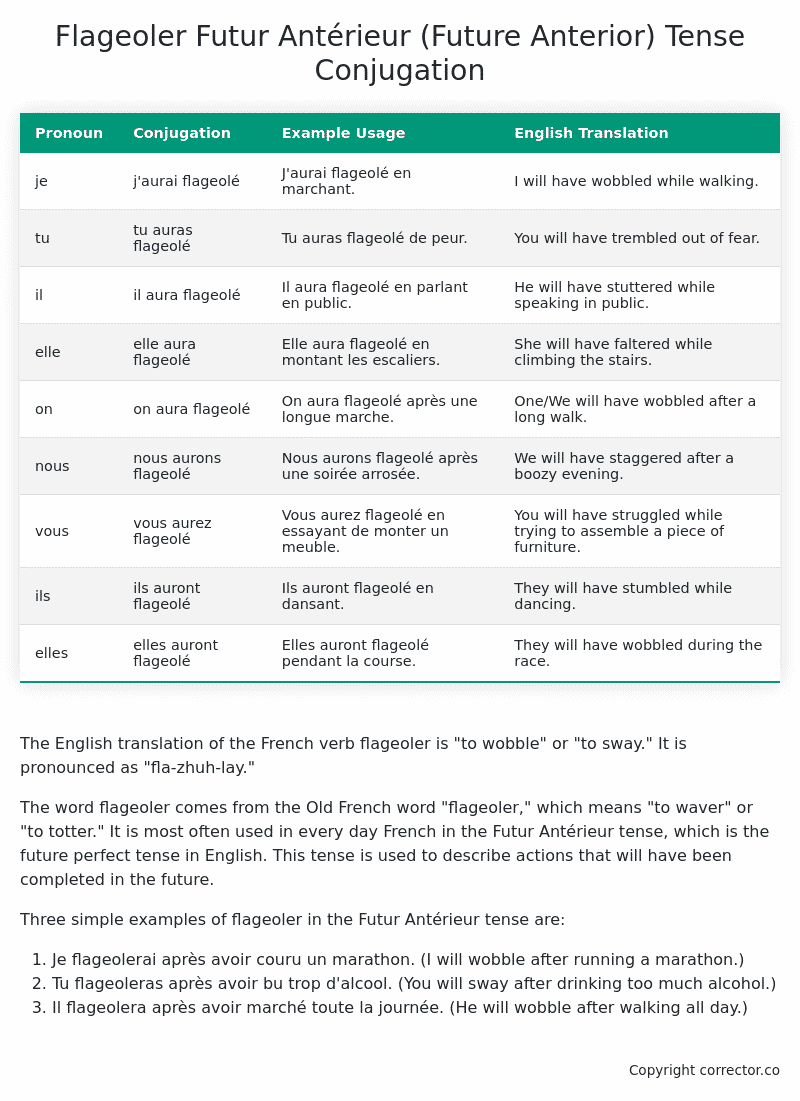Futur Antérieur (Future Anterior) Tense Conjugation of the French Verb flageoler
Introduction to the verb flageoler
The English translation of the French verb flageoler is “to wobble” or “to sway.” It is pronounced as “fla-zhuh-lay.”
The word flageoler comes from the Old French word “flageoler,” which means “to waver” or “to totter.” It is most often used in every day French in the Futur Antérieur tense, which is the future perfect tense in English. This tense is used to describe actions that will have been completed in the future.
Three simple examples of flageoler in the Futur Antérieur tense are:
- Je flageolerai après avoir couru un marathon. (I will wobble after running a marathon.)
- Tu flageoleras après avoir bu trop d’alcool. (You will sway after drinking too much alcohol.)
- Il flageolera après avoir marché toute la journée. (He will wobble after walking all day.)
Table of the Futur Antérieur (Future Anterior) Tense Conjugation of flageoler
| Pronoun | Conjugation | Example Usage | English Translation |
|---|---|---|---|
| je | j’aurai flageolé | J’aurai flageolé en marchant. | I will have wobbled while walking. |
| tu | tu auras flageolé | Tu auras flageolé de peur. | You will have trembled out of fear. |
| il | il aura flageolé | Il aura flageolé en parlant en public. | He will have stuttered while speaking in public. |
| elle | elle aura flageolé | Elle aura flageolé en montant les escaliers. | She will have faltered while climbing the stairs. |
| on | on aura flageolé | On aura flageolé après une longue marche. | One/We will have wobbled after a long walk. |
| nous | nous aurons flageolé | Nous aurons flageolé après une soirée arrosée. | We will have staggered after a boozy evening. |
| vous | vous aurez flageolé | Vous aurez flageolé en essayant de monter un meuble. | You will have struggled while trying to assemble a piece of furniture. |
| ils | ils auront flageolé | Ils auront flageolé en dansant. | They will have stumbled while dancing. |
| elles | elles auront flageolé | Elles auront flageolé pendant la course. | They will have wobbled during the race. |
Other Conjugations for Flageoler.
Le Present (Present Tense) Conjugation of the French Verb flageoler
Imparfait (Imperfect) Tense Conjugation of the French Verb flageoler
Passé Simple (Simple Past) Tense Conjugation of the French Verb flageoler
Passé Composé (Present Perfect) Tense Conjugation of the French Verb flageoler
Futur Simple (Simple Future) Tense Conjugation of the French Verb flageoler
Futur Proche (Near Future) Tense Conjugation of the French Verb flageoler
Plus-que-parfait (Pluperfect) Tense Conjugation of the French Verb flageoler
Passé Antérieur (Past Anterior) Tense Conjugation of the French Verb flageoler
Futur Antérieur (Future Anterior) Tense Conjugation of the French Verb flageoler (this article)
Subjonctif Présent (Subjunctive Present) Tense Conjugation of the French Verb flageoler
Subjonctif Passé (Subjunctive Past) Tense Conjugation of the French Verb flageoler
Subjonctif Imparfait (Subjunctive Imperfect) Tense Conjugation of the French Verb flageoler
Subjonctif Plus-que-parfait (Subjunctive Pluperfect) Tense Conjugation of the French Verb flageoler
Conditionnel Présent (Conditional Present) Tense Conjugation of the French Verb flageoler
Conditionnel Passé (Conditional Past) Tense Conjugation of the French Verb flageoler
L’impératif Présent (Imperative Present) Tense Conjugation of the French Verb flageoler
L’infinitif Présent (Infinitive Present) Tense Conjugation of the French Verb flageoler
Struggling with French verbs or the language in general? Why not use our free French Grammar Checker – no registration required!
Get a FREE Download Study Sheet of this Conjugation 🔥
Simply right click the image below, click “save image” and get your free reference for the flageoler Futur Antérieur tense conjugation!

Flageoler – About the French Futur Antérieur (Future Anterior) Tense
Construction
Common Everyday Usage Patterns
Interactions with Other Tenses
For example
Summary
I hope you enjoyed this article on the verb flageoler. Still in a learning mood? Check out another TOTALLY random French verb conjugation!


